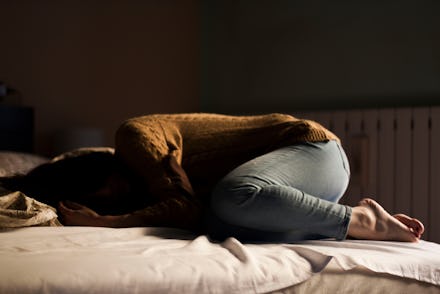The curious link between coronavirus and psychosis

Although perhaps more widely known for its respiratory symptoms, COVID-19 appears to wreak havoc on other organ systems, too. Some of its most worrisome effects have been on the brain. Indeed, reports have surfaced of patients experiencing delirium while fighting their infection, and even psychosis in the aftermath of it. What causes delirium and psychosis in COVID-19, and how common are these phenomena in patients diagnosed with the disease?
It’s important to preface all of this with the caveat that “the true incidence of neurological and psychiatric illness with COVID-19 is something we’re still studying,” says Robert Stevens, director of anesthesiology and critical care precision medicine at Johns Hopkins Medicine. Most of the evidence seems to be anecdotal. But some research evidence has begun to emerge, including a study published in the journal Brain on July 8, which reported that out of 43 patients with definite or suspected COVID-19, 10 had disease or damage that affected their brain function — a.k.a., encephalopathy — with delirium or psychosis.
Delirium is an acute change in cognitive function, often accompanied by sweating and rapid heart rate, Joseph Robert Berger, a professor of neurology at the Hospital of the University of Pennsylvania, tells Mic. It results in extreme confusion. He isn’t sure how long it lasts when it occurs with COVID-19, although it can last anywhere from days to weeks with other diseases.
Encephalopathy seems to underlie COVID-19-related delirium, which could explain why it tends to occur in hospitalized patients. “They are experiencing major physiological imbalances,” including high body temperature, high blood pressure, and low oxygen levels, to name a few, Stevens says. “All of those can cause significant disturbances in brain function.” Basically, COVID-19 appears to cause encephalopathy, which may then lead to delirium; it’s highly unlikely that the virus travels to the brain and acts directly on it, Berger says.
Older COVID-19 patients are probably also at greater risk of delirium, he adds. Not only are their brains less resilient, they often already have neurodegeneration and other brain abnormalities. Likewise, people with pre-existing neurological conditions, such as cognitive impairments and substance use disorders, are also at higher risk of delirium when hospitalized, Stevens says.
Psychosis, on the other hand, involves losing a grasp on reality, with symptoms that often include hallucinations and delusions. It’s less clear how long it can last in the context of COVID-19, Berger says. A few of his patients have experienced psychosis in the aftermath of infection, in contrast to delirium, which tends to happen during the course of infection. He knows of one patient who had a psychotic break within weeks of leaving the hospital for COVID-19, despite having no prior history of psychiatric illness.
In the Brain study, a 55-year-old COVID-19 patient reported visual hallucinations (seeing monkeys and lions) a few days after being discharged from the hospital. She also had other disturbing symptoms, such as auditory hallucinations and a Capgras delusion, which can make people believe someone close to them has been swapped out with an impostor. Her mental health improved over the course of three weeks, though, after she started taking antipsychotic medication.
One possible explanation for psychosis in the aftermath of infection is that it triggers an autoimmune response — basically, “the immune system attacks normal brain tissue,” Berger says. Something like this happens in paraneoplastic syndromes, in which the immune response to a tumor is also directed against the central nervous system, which can result in psychiatric symptoms.
Most studies on the possible relationship between COVID-19 and neuropsychiatric illness tend to focus on small numbers of patients, Stevens says, and they don’t indicate the frequency of these complications, or the biological mechanisms involved. He cautions against drawing a causal relationship from them — in other words, although intriguing and correlative, they don’t tell us whether COVID-19 actually makes people psychotic.
Again, viruses that cause psychiatric symptoms are extremely rare, and another, more plausible explanation is that social isolation and other stressors are nudging people already susceptible to psychosis over the edge.
Based on Berger’s patient, as well as the patient described in the Brain study, psychosis seems to emerge more frequently in hospitalized COVID-19 patients. But since most people who contract COVID-19 don’t require hospitalization, the risk of psychosis, as well as delirium, in those with the disease is probably pretty low, Berger says. And since so many people are getting infected in such a short period of time, the prevalence of psychiatric symptoms in COVID-19 may seem higher than it really is.
While psychosis is likely rare in people who've recovered from COVID-19, it’s fairly common for them to have high levels of anxiety, depression, and post-traumatic stress disorder, Berger says. “They don’t sleep well, they don’t eat well, they’re not feeling well,” he explains. “They’re not quite the same.” After all, they’ve essentially had a near-death experience.
We have yet to fully understand the long-term consequences of COVID-19, a disease that scientists only recognized in December — but “I don’t think one can say everything is going to be fine,” Berger says. The best defense is to avoid the infection in the first place. As slim as it might be, the risk of neuropsychiatric impacts is probably one most of us would prefer not to take.